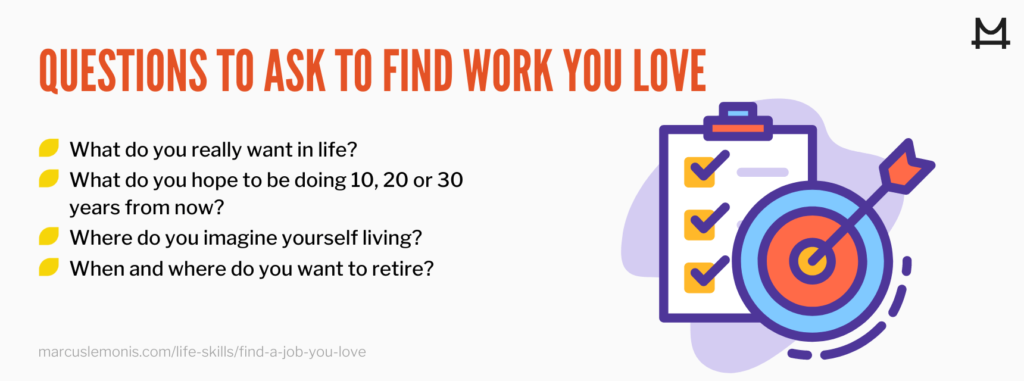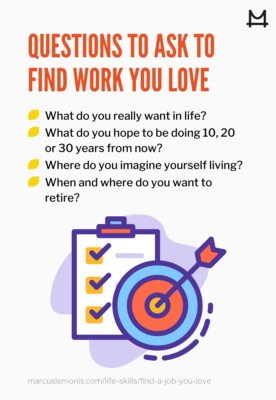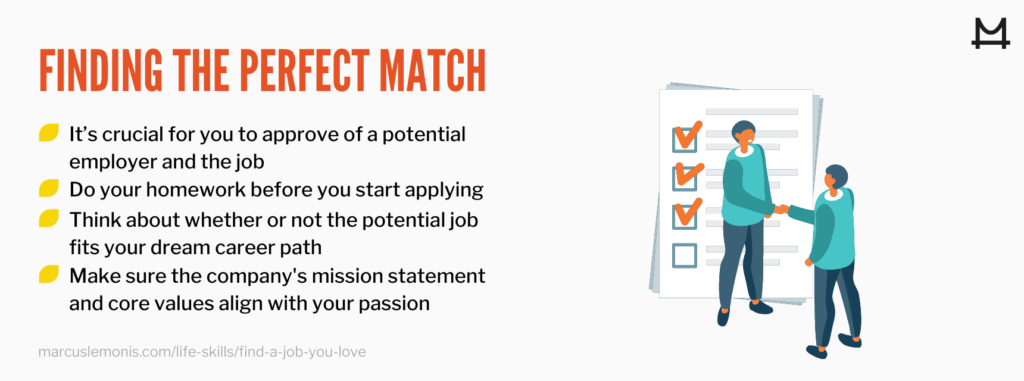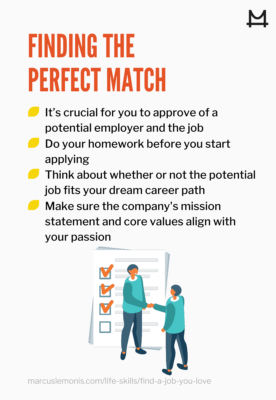
Why do so many people wind up in companies they don’t like or in roles they’re not especially suited for? Job mismatches are almost always the result of taking the wrong approach from the start. Most job seekers initially focus on employers: Which companies are hiring? What positions are available? What qualifications are they looking for? Which ones are most likely to hire me, and what are they willing to pay?
That whole line of thinking is exactly backwards. If you want to land your dream job, focus first on your dream. All the rest will eventually fall into place.
Finding Work That You Truly Love — How to Get Started
“If you don’t love what you do, you shouldn’t do it,” Marcus has said. Before you start combing job sites or sending resumes all over town, take some time to dream.
Ask yourself some important questions: What do you really want in life? What do you hope to be doing 10, 20 or 30 years from now? Where do you imagine yourself living? When and where do you want to retire?
Journaling is a great way to spark your imagination. Start writing down every thought or idea that makes you happy. Dream like you used to as a kid back when the possibilities were endless. Just let your thoughts flow. If you don’t hold back, the journal will help you create a colorful, detailed vision for your future. Don’t censor yourself. If you want to cure cancer, direct Oscar-winning films or take your seat behind the desk in the Oval Office, nothing’s stopping you from shooting for the stars.



Get a bird’s-eye view of your life so far. Reflect on the circumstances and events that shaped the person you are today. Some won’t be pretty, but embrace them anyway. “If that hadn’t happened, I wouldn’t have learned … I wouldn’t have met … I wouldn’t have been equipped … ” In the grand scheme of things, everything you go through helps to frame your future. If you see the value in every obstacle, hardship or disappointment in the past, you’ll become better rather than bitter.
Remember that this is your dream. It’s okay to ask for opinions or listen to advice from helpful friends but don’t let anyone discourage you or tell you to “get real”. As Marcus has said, “Get comfortable being your true self. Do it at the risk of being criticized.”
Discovering Your Passion
Once you have a well-rounded vision fixed firmly in your mind, start creating the road map that will make it a reality. Add mile markers and long-term goals. If you get stuck, ask yourself what you’re truly passionate about. What would you spend all your time doing if you had that luxury? List your favorite jobs and life experiences. What did they all have in common? Maybe all your favorites involved leadership, enriching your community or seeing that justice was done. Perhaps they all entailed teaching or negotiating. Thinking back, maybe you see now that a certain job wasn’t all that great. Why did you list it? Something like the cool trips you took or the freedom to be creative will probably jump out at you.
If you’re like most people, you’ll discover that you have several passions. Still, try to name the one common denominator that gets you all fired up. Think of that passion as an umbrella. All the goals you set, people you surround yourself with, and jobs you apply for should fit neatly underneath it. That passion will drive everything you do from here on out. That umbrella will cover you in stormy weather along the way.

What if you discover that you’re happiest when you’re solving crossword puzzles, fencing or juggling? It’s important to differentiate between hobbies and potential careers. Anything’s possible, but not everything is likely. You still have to earn a paycheck, and some hobbies don’t easily transition into paying jobs. If you love pet sitting in your spare time, you could very well own a training and grooming empire someday. A love of chemistry or technology could propel you to a highly lucrative career. Here’s something else to think about: People who are passionate about a hobby sometimes lose their love for it when it becomes a job. If you’re determined to make flower arranging or scuba diving a lifelong career, make sure that your passion for it is sustainable in a business context.
As you create your road map to a career you love, you’re bound to come across obstacles and bends in the road that scare you. Push through the fear, and put it to work for you. The greatest risks typically pay the greatest rewards. Don’t let time become an issue. “I’ll be almost 40 by the time I earn a PhD!” Well, you’ll be almost 40 whether you earn a PhD or not. There’s nothing worse than forever regretting that you didn’t try. Have faith in yourself. Choose to believe that rewarding work you were meant to do really does exist.
Getting Started
So now that you’ve narrowed down your passions and interests, it’s time to think about how to make your dream job a reality. As with everything else in life, it starts with preparation. Take the time to continue building your skill sets for this particular field of interest. For example, let’s say you decide to pursue a career in music. With music being such a broad industry, it would be beneficial to understand more than just one segment of that profession. Do some research and find a few courses you could take on production, music theory, sound editing, etc. That way you can widen your search for a job in the music industry as your skill sets continue to grow. Additionally, try and find someone you respect within the industry. Pick their brains on what it takes to make it professionally. Ask questions like, “What do you look for when hiring someone for this position?” or “What’s something about this industry that is often overlooked?” From online resources, to classes, coaching and developing new skill sets, the more you can learn about a particular job, the better prepared you’ll be before diving into that field professionally.

Finding the Perfect Match
For most people, blind dates rank right up there with public speaking on the stress scale. “Is she expecting someone younger?” “Will he think I’m shallow?” If your job search gives you the same kind of jitters — “Will the owner like me? Will I impress the hiring manager?” — rethink your approach. Go back to your vision. While it’s important to have the approval of a potential employer, it’s even more crucial for you to approve of them and the job they are offering. You’re in the driver’s seat, so to speak, of your own dream. That’s not arrogance. That’s determination to love what you do and love where you do it.
Do your homework before you start applying. If you’re having trouble coming up with a specific job title, take a couple of online career quizzes to get ideas. When you search job openings, keep that passion umbrella open.
- Would a certain job fit comfortably under it?
- Would the job help you get to that corner office on Wall Street you’ve always dreamed of?
- Do the company’s mission statement and core values align with your passion?
LinkedIn, Twitter and Facebook have a wealth of information on businesses and the people who work for them. Do your due diligence. Look for familiar names, and reach out to people who can give you the lowdown. If you know anyone in a position to hire you or write a referral, don’t hesitate to leverage your connections when you apply.


Rethinking the Interviewing Process
An interview should be a two-way street. Companies aren’t just checking you out. You’re checking them out as well. Asking the right questions will show that you’re thoughtful, prepared and genuinely interested.
- How long have you worked here, and what do you like best about the job?
- What will my responsibilities be on a typical day?
- Will I be working independently or with a team?
- How is the company structured? Who reports to whom?
- May I see a couple of projects similar to those I’ll be working on?
- Are there opportunities to explore other roles or advance my career?
- Do you provide developmental training and resources?
- How do you evaluate performance? What does success in this position look like to you?
- Where does the interviewing process go from here?
- Is there anything I can clear up for you that will help you make your decision?
Compensation might not come up in the first interview. It’s usually OK to ask about salary and benefits in the second meeting. However, focus first on explaining why you want to work for this company, why you’ll be an asset, and what you can bring to the table.
Taking Stock of the Company Culture
Finally, it’s vital that you get a feel for the company culture and day-to-day work environment. Is the vibe laid-back or formal? Do the employees seem upbeat and happy to be there? Ask the interviewer how feedback is exchanged, how conflicts are resolved and how success is celebrated. Ask about company events. Find out if the work schedule is flexible. In short, you’re not just looking for work that you love. You’re also looking for a workplace and co-workers that you love. If the second interview seems promising, ask if it’s possible to meet some of your potential team members. If the interviewer seems to resent your curiosity, run. Transparency is a key ingredient of high morale.

If you get an offer, there’s no shame in asking for time to think it over. Review your journal. Consult your road map. Does this job seem to belong on the map? Could it be an important milestone along the journey or even the final destination? If the answer is yes, you’re well on your way to a thrilling career that you love.
- Are you happy with your career path?
- What do you look for in your ideal job?





